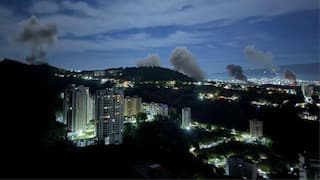Volcano Erupts Near Icelandic Capital Reykjavík, Lava Gushes Out For Third Time In 2 Years
In the week ahead of the eruption, thousands of small earthquakes were recorded in the area.

A volcano erupted on Monday near Iceland's capital Reykjavík, the country's meteorological office said, as reported by the news agency AFP. Following the eruption, lava gushed out in the area for the third time in two years. In the week ahead of the eruption, thousands of small earthquakes were recorded in the area. It signalled that magma beneath the surface was moving and that an eruption was about to occur.
According to the footage shared by the local media, a massive cloud of smoke can be seen rising from the ground as well as a substantial flow of lava at the site around 30 kilometres (19 miles) from Reykjavik, AFP reported. The smoke can be seen from the road connecting Reykjavíkto the international airport, with cars pulled over and people taking pictures.
"The eruption is taking place in a small depression just north of Litli Hrutur ('Little Ram' in Icelandic) from which smoke is escaping in a north-westerly direction," the meteorological office said. "There are three fissures with lava basically running in all directions," Thorvaldur Thordarson, Professor in Volcanology at University of Iceland, told AFP.
He further stated that the fissures are in total around 200 to 300 meters long and "it is a low intensity, effusive eruption." This means "it's not causing widespread threats due to explosive activity" but "if the eruption continues for long enough it could be a threat to infrastructure."
People were advised by the authorities not to visit the site until the assessment was finished. The magma broke through at around 16:40 GMT, just a few kilometres from two previous eruptions in the last two years, according to AFP. The first eruption occurred in the Geldingadalur valley on March 19, 2021. According to AFP, the second incident took place in the Meradalir valley on August 3, 2022. The area had been dormant for eight centuries prior to the eruption in 2021.
The highest number of active volcanic systems in Europe, 33, is found in Iceland, according to AFP.
ALSO READ: Wagner Group Fighters Came Close To Russian Nuclear Base During Mutiny: Report
The first eruption took place on March 19, 2021 in the Geldingadalur valley. The second occurred on 3 August 2022 in the Meradalir valley, as reported by AFP. Before the eruption in 2021, the region had remained dormant for eight centuries. The 2021 and 2022 eruptions attracted hundreds of thousands of visitors wanting to catch a rare glimpse of an active volcano.
Iceland has 33 volcanic systems which are currently active, the highest number in Europe, AFP reported.
Subscribe And Follow ABP Live On Telegram: https://t.me/officialabplive
Related Video
Vande Bharat: India’s First Vande Bharat Sleeper Train to Run Between Guwahati and Kolkata





































